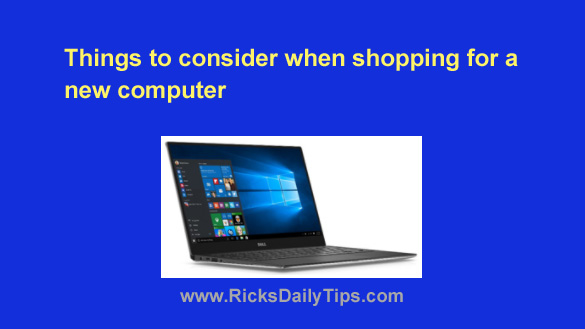 Note: The links in this post are affiliate links.
Note: The links in this post are affiliate links.
Shopping for a new computer has to be one of the most confusing tasks you’ll ever have to do.
With all the choices available, determining which model is the right one for you can be a nightmare.
Walk into any computer store and you’re likely to see aisle after aisle of desktop PCs, laptops and tablets, all running demo software that’s designed to make them all look as good as possible – and all the same.
How do you choose between brands and models when they all look so similar and have specs that seem to closely match all the others in that aisle?
Don’t look to the store’s sales staff for help because they’ll more likely than not try to talk you into buying the computer that’s best for the store’s profit margin instead of the one that’s best for you.
Even though computers have come down in price considerably in recent times, even the cheapest models will set you back hundreds of dollars.
That’s why it’s important to make sure your money is well spent on a computer that will do everything you need for it to do without paying for extras that you don’t need and will never use.
With that goal in mind, this post offers a few tips that can help you shop for the computer that best matches YOUR specific needs.
The first thing to consider is the type of computer you’re interested in buying.
If you want something that is ultra-portable and can easily be used on the go while not requiring a ton of computing power, your logical choice is probably going to be a tablet.
Modern tablets are perfect for Internet use, sending and receiving email, using lightweight apps and playing addictive, yet resource-light games.
If you decide to go with a tablet, you’ll need to decide whether you can get by with Wi-Fi connectivity or if you need to go all out and buy a model with cellular Internet connectivity so you can have access to the Internet virtually anywhere.
Cellular connectivity is awesome, but be prepared to pay a hefty premium for it.
You’ll also need to decide how much storage you’ll need and how beefy the CPU needs to be. Depending on what you need, you can spend anywhere from $40 to well over a grand!
It all comes down to two things: Your needs and your budget.
If you decide that a tablet is the way to go, click here to see the great selection at Amazon. Once there, check the specs of the various models and read the customer reviews.
And remember, you can always refine your search by adding the words Android, iPad, etc.
If you need something that’s still portable, but has a larger screen and keyboard as well as a faster CPU and more storage, then a laptop/notebook PC will probably be your best bet.
Of all the computer types you can choose from, a laptop will give you the best mix of portability, speed and power.
If you decide that a laptop is indeed what you’re looking for, the next thing to determine is what you plan to use it for. Do you want to use it primarily for web surfing and Internet use?
If so, a low-cost “budget” laptop should meet your needs quite nicely.
This page on Amazon has a great selection of budget laptops to choose from. Again, be sure to check out the specs and read the customer reviews!
If you’re looking for a laptop that can play even the most demanding games, you’ll want to shop for a gaming laptop with plenty of RAM along with a powerful CPU and graphics card.
It’s especially important to pay attention to the customer reviews when shopping for a gaming laptop because they are so much more expensive than budget models.
You can check out Amazon’s great selection of gaming laptops right here.
And finally, if you won’t be taking your new PC with you and you’d really like something that’s both upgradable and expandable, the obvious choice is a desktop PC.
A desktop computer gives you the flexibility to add extra add-on cards, second (or even third) hard drives or SSDs, and depending on the model maybe even a new motherboard/CPU combo at some point in the future.
As with laptops, desktop computers are available in price and feature ranges that go all the way from “cheap” budget models to expensive and powerful gaming rigs
.
Again, be sure to compare those specs and customer reviews.
Bottom line: As you can see, there’s a lot to consider when it comes to shopping for the computer that will best suite YOUR specific needs, but the tips listed above can help you make the best choice possible.
Be sure to remember these two things:
1 – If you plan to shop for your new computer at a local retail store, research the current models online so you’ll know what’s available and which model(s) will best fill your needs.
That way you won’t get talked into buying a machine that’s better for the store’s bottom line than it is for your computing needs.
2 – Make sure you take advantage of the vast number of actual user reviews that are available online.
After all, if a lot of people like a given machine, chances are you’ll end up liking it too.